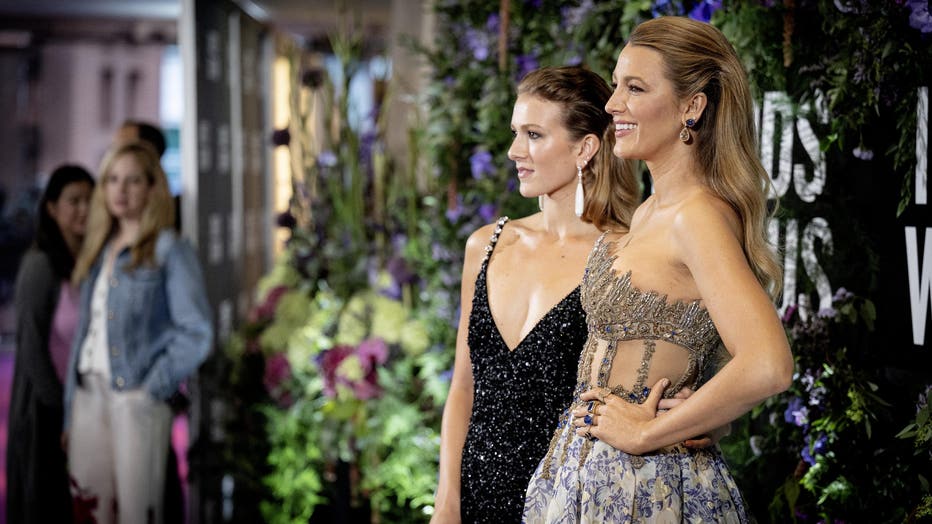‘It Ends With Us’ film prompting conversations on domestic violence awareness

'It Ends With Us' puts spotlight on domestic violence
The film is an adaptation of the book authored by Colleen Hoover, of the same title. Critics of the film say the story and the press promotions have "romanticized" domestic violence. Pamela Jacobs, CEO of National Resource Center on Domestic Violence, joins LiveNOW from FOX to explore the realities of domestic abuse and share resources for help.
"It Ends With Us," one of the top movies at the box office right now, has been dominating the headlines and social media for the last few weeks.
The movie had a massive debut weekend, raking in $50 million, stars one of the most popular actresses in Hollywood right now, Blake Lively, and is based on a bestselling Colleen Hoover novel by the same name.
But the film’s serious topic, domestic violence, is also prompting greater conversations that are raising awareness.
Pamela Jacobs, CEO of National Resource Center on Domestic Violence, joined LiveNOW from FOX to explore the realities of domestic abuse and share resources for help.
Here are some of the takeaways from her conversation:
"It Ends With Us" criticism

Blake Lively's interview about It End With Us sparks conversation
Blake Lively stared in new movie "It Ends With Us," based on Colleen Hoover's best selling book by the same name. She's done several promotional interviews, including one with Fox 32. Some fans are saying she's not using her platform to discuss important issues portrayed in the movie.
Although wildly popular, "It Ends With Us" has also drawn criticism.
First, some believe Lively’s behavior during her press tour hasn’t properly conveyed the heavy and serious tone of the story. She has been donning fun, flowery outfits and talking about her new hair care line, and rumors of drama behind the scenes with co-star and director Justin Baldoni have been mounting.

FILE - Actresses Blake Lively (R) and Isabela Ferrer (L) pose for a photocall during the premiere of the movie "It Ends With Us" in Copenhagen on August 9, 2024. (Photo by Nils Meilvang / Ritzau Scanpix / AFP via Getty Images)
Secondly, part of the bigger picture is that some accuse the overall story and book by Colleen Hoover of "romanticizing" domestic violence.
Jacobs, who shared that she is a survivor of abuse and has worked with cases for over 20 years, said she found a lot of what the film portrays to be accurate - "although it does definitely oversimplify what happens in these relationships and especially oversimplifies how we’re able to get away," she added.
"I think it's also important to know that even when we see depictions of someone who's able to just quickly leave an abusive relationship, that's not usually accurate, that's not typically what we see. So it's important not to judge yourself if your story doesn't look like this, if it took you longer to get away, or if you're still there, that's okay. You're not alone."
She added that, while she didn’t really believe the film "romanticized" an abusive relationship, she thought some of the trailers and promos failed to give adequate trigger warnings.
A trigger warning is a statement that alerts a reader or viewer that what they’re about to read or see contains potentially distressing material, so as to not catch them off guard and consume content that they would rather avoid.
Does The Dog Die, a popular site that crowdsources trigger warnings for movies, TV shows and books, says the film contains eight potentially triggering events, including domestic violence and assault. The page for the 2016 book is much more in depth, and says the book contains 31 potentially triggering events.
Early warning signs of domestic violence
The film is opening up conversations that raise awareness of domestic violence and the associated behaviors and patterns.
Here are some early warning signs of domestic violence from the National Resource Center on Domestic Violence, which Jacobs elaborates on in her video interview:
- Jealousy
- Controlling behavior, which could be disguised as concern
- Not respecting boundaries
- Making you feel nervous or uneasy
- Wanting to commit quickly
Tips for supporting someone in an abusive relationship
If you think someone in your life is with an abusive partner, Jacobs said the biggest thing to look out for is changed behavior.
"If you notice that your friend or a loved one is, they seem nervous when they're with their partner, they're not able to spend time with you as much as they used to - their behavior is changing. I think these are some of the biggest things to look out for," she said.
"If we're only looking for physical marks on the people we love and people we care about, we're probably going to miss some of those early signs."
Jacobs shared some advice for those hoping to help a loved one:
- Don’t judge
- Don’t push someone or try to force them to leave before they’re ready
- Tell them you are worried about them
- Tell them you care for them
- Offer support whether they stay or they leave
- Keep in contact
Resources for domestic violence victims
- Call The Hotline at 800-799-SAFE (7233)
- Text START to 88788
- Chat on thehotline.org
- More information here at thehotline.org
"A common misconception people have is that if you reach out and call a hotline or reach out to a domestic violence program, that you'll have to leave, but that's really not true," Jacobs said.
And she reminded that all correspondence with the hotline are anonymous.
"They're not going to ask you to leave. They're just going to talk with you and try to help you come up with a plan to try to keep yourself safe."

